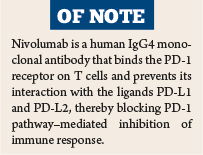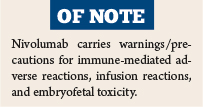Supporting Efficacy Data
Approval was based on the finding of an overall survival advantage in an open-label phase III trial (CheckMate 141) comparing nivolumab with investigator’s choice of chemotherapy (cetuximab [Erbitux], methotrexate, or docetaxel) in patients with recurrent or metastatic squamous cell carcinoma of the head and neck and disease progression on or within 6 months of receiving platinum-based chemotherapy.2,3 A total of 361 patients were randomized 2:1 to nivolumab at 3 mg/kg every 2 weeks (n = 240) or investigator’s choice (n = 121) with cetuximab at 400 mg/m2 once, then 250 mg/ m2 weekly (n = 15), methotrexate at 40 mg/m2 weekly (n = 52), or docetaxel at 30 mg/m2 weekly (n = 54).
Patients had a median age of 60 years (31% ≥ 65 years), 83% were white and 12% were Asian, baseline Eastern Cooperative Oncology Group (ECOG) performance status was 0 for 20% and 1 for 78%), 76% were former/current smokers, 90% had stage IV disease, and 45% had received only 1 prior line of systemic therapy.

Median overall survival was 7.5 months (95% confidence interval [CI] = 5.5–9.1 months) in the nivolumab group vs 5.1 months (95% CI = 4.0–6.0 months) in the investigator’s choice group (hazard ratio [HR] = 0.7, P = .0101). In an exploratory analysis among patients with programmed cell death ligand 1 (PD-L1)–positive disease (≥ 1% expression), median overall survival was 8.7 vs 4.6 months (HR = 0.55, 95% CI = 0.36–0.83). Among PD-L1–negative patients, median overall survival was 5.7 vs 5.8 months (HR = 0.89, 95% CI = 0.54–1.45). No statistically significant difference between groups was observed for progression-free survival or objective response rate.
How It Works
Nivolumab is a human immunoglobulin G4 (IgG4) monoclonal antibody that binds the programmed cell death protein 1 (PD-1) receptor on T cells and prevents its interaction with the ligands PD-L1 and PD-L2, thereby blocking PD-1 pathway–mediated inhibition of immune response, including antitumor immune response.
Binding of PD-L1 and PD-L2 to the PD-1 receptor inhibits T-cell proliferation and cytokine production. Upregulation of PD-1 ligands occurs in some tumors, and signaling through this pathway can contribute to inhibition of active T-cell tumor immune surveillance. In syngeneic mouse tumor models, blocking PD-1 activity results in decreased tumor growth.
How It Is Used
The recommended dose of nivolumab in squamous cell carcinoma of the head and neck is 3 mg/kg given as an intravenous infusion over 60 minutes every 2 weeks until disease progression or unacceptable toxicity.
Infusion should be interrupted or slowed in patients with mild or moderate infusion reactions. Nivolumab should be discontinued for severe or life-threatening infusion reactions.
New Approval for Nivolumab
- Nivolumab (Opdivo) was approved for treatment of recurrent or metastatic squamous cell carcinoma of the head and neck with disease progression on or after platinum-based therapy.
- The recommended dose of nivolumab in squamous cell carcinoma of the head and neck is 3 mg/kg given as an intravenous infusion over 60 minutes every 2 weeks until disease progression or unacceptable toxicity.
In patients receiving nivolumab for squamous cell carcinoma of the head and neck, treatment should be withheld for grade 2 pneumonitis, grade 2 or 3 diarrhea or colitis, alanine transaminase (ALT) or aspartate transaminase (AST) more than 3 to 5 times the upper limit of normal or total bilirubin more than 1.5 to 3 times the upper limit of normal, serum creatinine more than 1.5 to 6 times the upper limit of normal, grade 2 or 3 hypophysitis, grade 2 adrenal insufficiency, grade 3 hyperglycemia, grade 3 rash or suspected Stevens-Johnson syndrome or toxic epidermal necrolysis, new-onset moderate or severe neurologic signs or symptoms (potential immune-related encephalitis), and first occurrence of other grade 3 adverse reactions. There are no recommended dose modifications for hypothyroidism or hyperthyroidism.
Nivolumab should be permanently discontinued for grade 4 diarrhea or colitis, grade 4 hypophysitis, grade 3 or 4 adrenal insufficiency, grade 4 hyperglycemia, grade 4 rash or confirmed Stevens-Johnson syndrome or toxic epidermal necrolysis, grade 3 or 4 pneumonitis, AST or ALT more than 5 times the upper limit of normal or total bilirubin more than 3 times the upper limit of normal, serum creatinine more than 6 times the upper limit of normal, immune-mediated encephalitis, recurrence of grade 3 adverse reaction, life-threatening or grade 4 adverse reaction, requirement of at least 10 mg/d of prednisone or the equivalent for more than 12 weeks, and persistent grade 2 or 3 adverse reactions lasting at least 12 weeks.
Safety Profile

In the phase III trial, adverse events and laboratory abnormalities among nivolumab recipients were generally similar to those occurring in patients receiving nivolumab for melanoma and non–small cell lung cancer. Adverse events led to discontinuation of nivolumab in 14% of patients and to treatment delay in 24%. Serious adverse events occurred in 49% of patients, with the most common occurring in at least 2% being pneumonia, dyspnea, respiratory failure, respiratory tract infection, and sepsis.
The most common adverse events occurring in at least 10% of nivolumab patients and at a higher incidence than in the investigator’s choice group were cough and dyspnea. The most common laboratory abnormalities occurring in at least 10% of nivolumab patients and at a higher incidence than in the investigator’s choice group were increased alkaline phosphatase, increased amylase, hypercalcemia, hyperkalemia, and increased thyroid-stimulating hormone.
Nivolumab carries warnings/precautions for immune-mediated adverse reactions, including immune-mediated pneumonitis, colitis, hepatitis, endocrinopathies, nephritis and renal dysfunction, rash, and encephalitis. It also carries warnings/precautions for infusion reactions, complications of allogeneic hematopoietic stem cell transplantation after nivolumab treatment, and embryofetal toxicity.
Patients should be monitored for changes in liver, kidney, thyroid, and neurologic function and for hyperglycemia. Breastfeeding women should discontinue breastfeeding while receiving nivolumab. ■
References
1. U.S. Food and Drug Administration: Nivolumab for SCCHN. Available at www.fda.gov/Drugs/InformationOnDrugs/ApprovedDrugs/ucm528920.htm. Accessed November 22, 2016.
2. Opdivo (nivolumab) injection for intravenous use prescribing information, Bristol-Myers Squibb Company, November 2016. Available at www.accessdata.fda.gov/drugsatfda_docs/label/2016/125554s022lbl.pdf. Accessed November 22, 2016.

